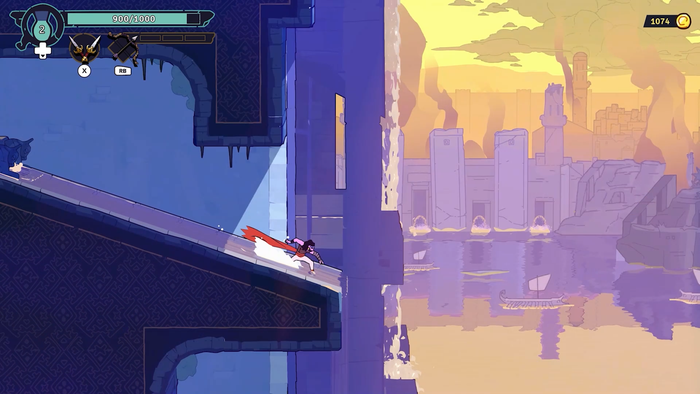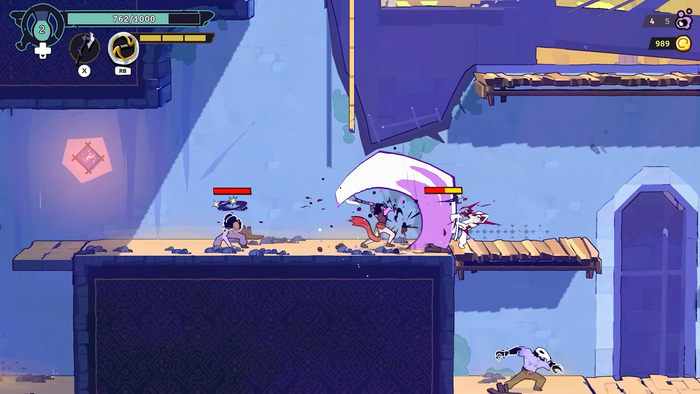Ubisoft’s Prince of Persia series is having a bit of a resurgence in 2024, and it’s been all about embracing the original’s sidescrolling roots. Today Ubisoft unveiled a ‘roguelite’ sidescrolling Prince of Persia game called The Rogue: Prince of Persia, the second game bearing the Prince of Persia branding to debut this year.
With The Rogue: Prince of Persia, developer Evil Empire brings their experience developing Dead Cells (originally by Motion Twin) with the Prince of Persia series’ scope and sense of adventure. The game will also follow Dead Cells’ precedent of launching in Early Access, with a slew of content updates already in the pipeline.
In an email interview with Game Developer, game director Lucie Dewagnier and art director Dylan Eurlings shared details about the process of bringing the Prince of Persia series to the roguelike genre, and how Evil Empire’s time working on Dead Cells taught them the importance of sticking to what makes classic 2D adventures so enjoyable.
The Rogue: Prince of Persia emphasizes fluid platforming and combat over complex upgrades
In The Rogue: Prince of Persia, you take on the role of the titular Prince, heir to the throne of a fictional kingdom inspired by the Persian city of Ctesiphon. Following an invasion from a Hun army led by a ruthless warlord, the Prince tries and fails to beat back the many foes and generals that have swarmed the kingdom, but he inevitably falls in battle.
Thanks to a mysterious artifact in his possession, the Prince returns to the beginning of his mission while retaining the knowledge from his previous attempt. Using his experiences and growing skills, the Prince unlocks new tactics and abilities to put him on equal footing with the Hun army, and encounters more of the magical powers inhabiting the land.

Image via Evil Empire/Ubisoft.
The Rogue carries many familiar roguelite-isms from games like Dead Cells and Supergiant Games’ Hades—the procedurally generated stages, randomized loot drops, and a sprawling setting that gets more dense as you explore. However, Evil Empire’s take on Prince of Persia sticks close to the series’ focus on graceful, acrobatic combat and fast-paced platforming. It’s generally less concerned about being an action-RPG that expects players to crunch numbers and keep track of complex loadouts.
According to Evil Empire art director Dylan Eurlings, The Rogue: Prince of Persia is about embracing the original Prince of Persia’s sense of adventure while injecting that spirit into the mold of a roguelite—where every run introduces new combat and traversal challenges to overcome.”
The Rogue: Prince of Persia takes its root in the DNA of previous Prince of Persia games and the development team always kept in mind the gameplay pillars of the franchise that make it so unique: flowy traversal, iconic wall-running, acrobatic combat and a variety of trap-filled environments,” according to its art director. “Add to that a bit of fantasy and a unique bestiary of corrupted enemies and you have a [Prince of Persia] game!”
“In The Rogue: Prince of Persia, players will embark in satisfying traversal exploration, combined with fast-paced environmental combat. That is what makes the game so unique: you have to always be in movement and use your environment to move around and fight enemies. The wall-run mechanic itself is our most unique feature, something that’s never been done before in 2D roguelites.”
To live and die (and repeat) in ancient Persia
Playing The Rogue: Prince of Persia is a unique experience, distinct from other 2D action games. It shares similarities with the recent metroidvania experience of The Lost Crown but stands out for its focus on keeping each run fresh.
The iconic wall-run adds a unique dimension to the expanding platforming sequences and combat encounters. Wall running only occurs on sections of the level where the walls are marked by footsteps, but their placement shifts the feel of traversal in a genre that normally relies on double jumps to act as skill and progression barriers.
Evil Empire’s new roguelite felt very much like an update to the classic Prince of Persia game but with a more fast-paced and easy-to-pick-up approach to it. According to the game director, their work on Dead Cells taught them the importance of having an “instant fun” element, which ensures that their game is easy for all players to get into before adding in the familiar challenges and trials that the Prince of Persia series is known for.

Image via Evil Empire/Ubisoft.
With The Rogue: Prince of Persia, the game’s experience leans more into the acrobatic combat and advancing platforming from the series, which is a nice change for stat-heavy roguelike games.
The Rogue also emphasizes storytelling and investigating your world. A surprising addition was that the game has a memory board system, where the Prince keeps track of every interaction with supporting characters from the zones he explores. Some of these characters will give the Prince intel on how to access new areas and find hidden secrets, which again add to the memory board.
Inspired by other roguelites, the board showcases the slate of characters players will encounter in-game.
So far, The Rogue: Prince of Persia looks to stay true to the series’ classic formula and offer a stylized approach to the genre. As with Dead Cells, Ubisoft and Evil Empire will be releasing The Rogue as an Early Access game on May 14, and the developers will be taking in feedback from the player community in its pre-1.0 period.
This will be the first Ubisoft game premiering in Early Access—a release strategy that’s considered a core driver of success for many roguelike games including Dead Cells, Hades, and Eremite Games’ Against the Storm.
For game director Lucie Dewagnier, Evil Empire’s jump into Prince of Persia was an opportunity to take their successes on Dead Cells into a series the devs held in high regard. “It was very exciting for us to work on a Prince of Persia game and the collaboration was a blast, said the game director. “Ubisoft trusted us to make a great game and gave us a lot of creative freedom so that we could bring our vision to life. We did our best to respect the PoP pillars that the fans love so much while crafting a new and exciting roguelite experience.”